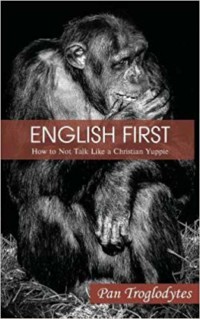Title: English First: How to Not Talk Like a Christian Yuppie
Author: Pan Troglodytes
Publisher: Toplink Publishing, LLC
ISBN: 978-1949804379
Pages: 84
Genre: Christian, Self-Help, Reference, Education
Reviewed by: Arnold Carreiro
Pacific Book Review
Pan Troglodytes, the author of English First, has written a creative two-in-one book that is partially a rapid-fire English lesson, and partially a strongly worded series of deeply personal thoughts about how he came to accept Jesus Christ as his savior. I should point out that I absolutely appreciated his penname; “Pan Troglodytes” is the scientific name for the common chimpanzee, as well as the sly references to his primate persona slipped in along the way. His personality shines through with every passage, and any reader can tell that this book was written with a strong desire to help people to sound more articulate, and his encouraging tone carries throughout the entire guide.
The first half of English First in a breathless series of expertly explained tips that clearly demonstrate how to correctly use or pronounce a number of common and uncommon phrases and words, such as “free gift” (he believes that since a “gift” is intended to be presented freely by default), the subtle difference between the words “fortunate” (to be lucky, privileged, or blessed) and “fortuitous” (referring to something accidental or unplanned), the fact that “bad” is an adjective and that “badly” is an adverb (and how to correctly use both words), and the proper elocution of the word “bulimia.” I’m a little surprised that the frequently heard mistake, “ATM machine,” didn’t make the cut, but if you are a stickler for proper grammar and spot-on articulation, or someone who needs some help with both, you will get a kick out of this book.
These notes are presented in a way which suggests you’d have to be a “yuppie” to speak like that, but unfortunately, the author doesn’t define exactly what a yuppie is. Language evolves, and as a writer myself, I’ve rolled my eyes at how popular dictionaries are quick to adapt to the frequent misuse of language as the new textbook definition, instead of standing firm as the bastion of grammatical correctness, so I can identify with the intent of this book.
The book shifts focus halfway through as the author shares a captivating story about his own salvation in “How to Read the Bible,” and this surprising transition is a spiritually beneficial, scripturally sound, and extremely well-researched guideline for living as a Christian, while emphasizing the incredible importance of accepting Christ into one’s life. As unique this two-part book is, English First is well-worth the price of admission.


